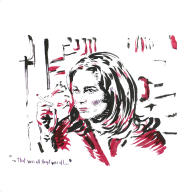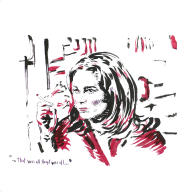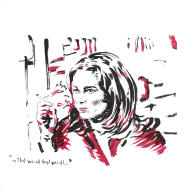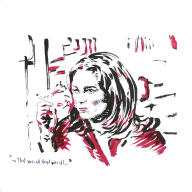Born Karen Blanche Ziegler in Park Ridge, Illinois, Black was already pursuing her dreams of being an actress as a teenager. During her summer vacations, she took jobs with summer stock theaters, and scored her first paid acting job when she was 17. After graduating high school, she studied theater at Northwestern University under teachers including Alvina Krause. However, she was disappointed in her training, and dropped out after two years at Northwestern. In 1960, she moved to New York and worked odd jobs as she continued to act. That year, she briefly joined the Actors Studio and married her first husband, Charles Black; though the marriage ended before 1960 was over, the surname stuck. Black made her film debut in 1960's The Prime Time, but was so disillusioned with the results that she focused on theater work for several years, culminating with a Best Actress Award nomination from the New York Drama Critics Circle for her Broadway debut in 1965's The Playroom. The next year, she revisited her film career with a leading role in Francis Ford Coppola's comedy You're a Big Boy Now. The positive notices she received led her to move to Los Angeles, and in 1967 she appeared on TV shows such as Mannix and Adam-12.
Black secured one of her career-defining roles in 1969's counterculture classic Easy Rider. Her unflinching portrayal of a prostitute paved the way for similarly gritty, uncompromising performances in films such as 1970's Five Easy Pieces, where her work earned her Golden Globe and New York Film Critics Circle awards for Best Supporting Actress as well as an Academy Award nomination for Best Supporting Actress; 1971's Drive, He Said; and the following year's Cisco Pike and Portnoy's Complaint. In 1973, she first ventured into the horror genre that became a significant part of her later career with the occult thriller The Pyx.
Over the next few years, Black did some of her most commercial -- and most critically acclaimed -- work. In 1974, she appeared in Airport 1975 and in The Great Gatsby as Myrtle Wilson, a role for which Black won her second Golden Globe for Best Supporting Actress. The following year, she took on three roles in the cult favorite TV anthology film Trilogy of Terror. During this time, Black also ventured into singing and songwriting, and headed into the studio with session musicians and producers including Bones Howe and Elliott Mazer to record her original compositions as well as covers of popular songs she liked. Black's talent for singing and writing songs played a vital part in Robert Altman's 1975 classic Nashville. Along with portraying country singer Connie White, she wrote and performed two of the songs on the film's Grammy-nominated soundtrack. Also in 1975, Black's performance in The Day of the Locust earned her a Golden Globe nomination for Best Actress.
In the second half of the '70s, Black's roles leaned into horror and suspense films. Her career highlights from this time include her turns in Alfred Hitchcock's final film, Family Plot, and Burnt Offerings (both from 1976), as well as 1977's TV movie The Strange Possession of Mrs. Oliver, in which she played a dual role. She also made several TV appearances performing music on television at this time, including 1976 spots on Dolly Parton's and Bobby Vinton's variety shows. Black rounded out the decade with roles in 1978's Capricorn One and 1979's In Praise of Older Women, which drew controversy for its portrayal of a middle-aged woman's sexual relationship with a teenage boy.
In the early '80s, she continued to alternate between TV movies like 1980's Police Story: Confessions of a Lady Cop and more challenging theatrical fare such as the following year's South African drama Killing Heat. For 1982's Robert Altman-directed Broadway production of Come Back to the Five and Dime, Jimmy Dean, Jimmy Dean and its film adaptation, Black immersed herself in research for her performance as Joanne, a trans woman living in a small town in Texas. Her work later in the decade ranged from comedies like 1983's Can She Bake a Cherry Pie? and 1989's Homer and Eddie to horror movies including 1985's Cut and Run and the following year's Invaders from Mars.
Horror, along with arthouse films, dominated Black's filmography in the 1990s and into the 21st century. Along with roles in 1990's Mirror, Mirror and 1991's Children of the Night, she reunited with Altman for a cameo in 1992's The Player. In 1993, she performed in Dark Blood, a drama directed by George Sluizer that remained incomplete for years after another one of its stars, River Phoenix, died while the film was being made. Later, she appeared in 1996's Children of the Corn IV: The Gathering and in 1997's Conceiving Ada, a feminist sci-fi film that also starred Tilda Swinton. That year, Black's musical side also resurfaced in the film Dogtown, where she played a singer in a small Missouri town, and when she appeared on the public access TV show Decoupage! performing Sonny Bono's "Bang Bang" backed by L7. Her 2003 turn as Mother Firefly in Rob Zombie's first film House of 1000 Corpses burnished her reputation as a horror icon, while her work in 2005's Firecracker earned her a Best Actress Award and a Career Achievement Award at Portugal's Fantasporto International Film Festival.
In the late 2000s, Black further broadened her horizons. Along with providing live narration to Guy Maddin's film Brand Upon the Brain! on a tour throughout the U.S., in 2007 she made her debut as a playwright with Missouri Waltz, in which she also starred. Two years later, she appeared in the film noir homage Stuck! She also met singer/songwriter Cass McCombs, and the pair became avid collaborators, with Black appearing on the song "Dreams-Come-True-Girl" from his 2009 album Catacombs. In 2010, Black was diagnosed with ampullary cancer, but her projects, including the 2012 John Landis film Some Guy Who Kills People and a completed version of Dark Blood, continued to be released.
Following her death in August 2013, she appeared in the 2015 Death Grips video "Bottomless Pit," in which she read lines from a screenplay written by bandmember Zach Hill. That year, Black's fourth husband, Stephen Eckelberry, discovered a stash of tapes that included her '70s studio sessions. McCombs restored and compiled the recordings into Dreaming of You (1971-76), which Anthology Recordings released in July 2021. ~ Heather Phares, Rovi















